2008年总统选举-奥巴马与麦凯恩第一场辩论赛文本
2008美国总统竞选辩论中英文对照(可编辑)
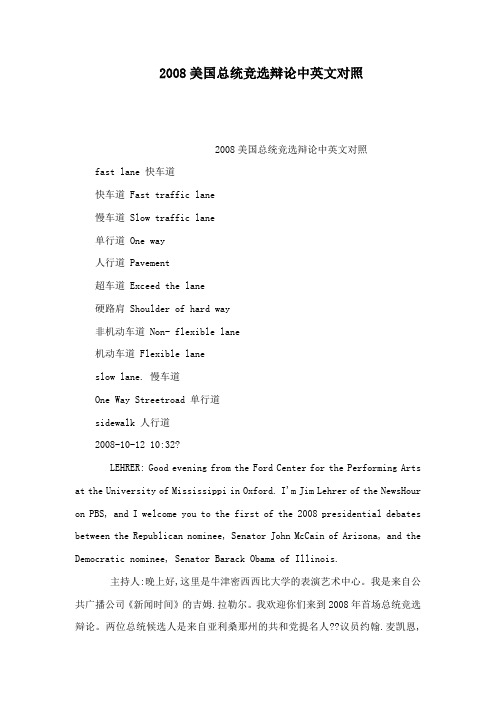
2008美国总统竞选辩论中英文对照2008美国总统竞选辩论中英文对照fast lane 快车道快车道 Fast traffic lane慢车道 Slow traffic lane单行道 One way人行道 Pavement超车道 Exceed the lane硬路肩 Shoulder of hard way非机动车道 Non- flexible lane机动车道 Flexible laneslow lane. 慢车道One Way Streetroad 单行道sidewalk 人行道2008-10-12 10:32?LEHRER: Good evening from the Ford Center for the Performing Arts at the University of Mississippi in Oxford. I'm Jim Lehrer of the NewsHour on PBS, and I welcome you to the first of the 2008 presidential debates between the Republican nominee, Senator John McCain of Arizona, and the Democratic nominee, Senator Barack Obama of Illinois.主持人:晚上好,这里是牛津密西西比大学的表演艺术中心。
我是来自公共广播公司《新闻时间》的吉姆.拉勒尔。
我欢迎你们来到2008年首场总统竞选辩论。
两位总统候选人是来自亚利桑那州的共和党提名人??议员约翰.麦凯恩,和来自伊利诺斯州的民主党提名人??议员贝拉克.奥巴马。
注:牛津,密西西比南部一城市,位于田纳西州孟斐斯东南偏南。
是密西西比大学的所在地老密西,建于1844年,它是威廉姆?福克纳的家乡。
人口9,882 The Commission on Presidential Debates is the sponsor of this event and the three other presidential and vice presidential debates coming in October.总统竞选辩论委员会是这次辩论以及即将在10月份的另外三次总统竞选辩论和副总统竞选辩论的主办者。
奥巴马2008年总统大选获胜后演讲
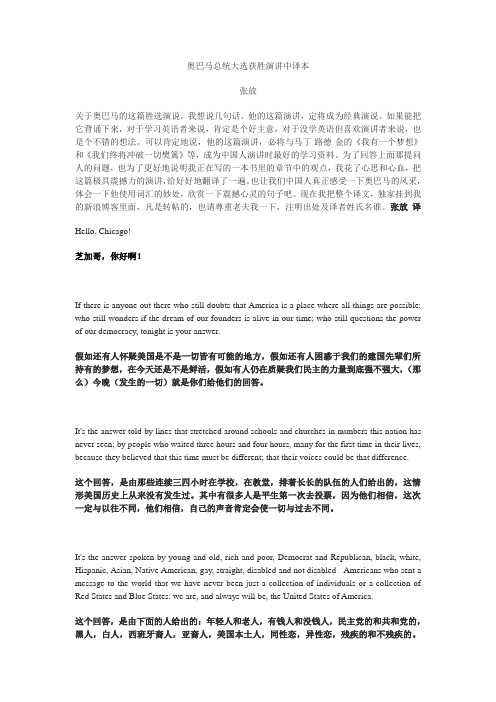
奥巴马总统大选获胜演讲中译本张放关于奥巴马的这篇胜选演说,我想说几句话。
他的这篇演讲,定将成为经典演说。
如果能把它背诵下来,对于学习英语者来说,肯定是个好主意,对于没学英语但喜欢演讲者来说,也是个不错的想法。
可以肯定地说,他的这篇演讲,必将与马丁·路德·金的《我有一个梦想》和《我们终将冲破一切樊篱》等,成为中国人演讲时最好的学习资料。
为了回答上面那提问人的问题,也为了更好地说明我正在写的一本书里的章节中的观点,我花了心思和心血,把这篇极具震撼力的演讲,给好好地翻译了一遍。
也让我们中国人真正感受一下奥巴马的风采,体会一下他使用词汇的妙处,欣赏一下震撼心灵的句子吧。
现在我把整个译文,独家挂到我的新浪博客里面,凡是转帖的,也请尊重老夫我一下,注明出处及译者姓氏名谁。
张放译Hello, Chicago!芝加哥,你好啊!If there is anyone out there who still doubts that America is a place where all things are possible; who still wonders if the dream of our founders is alive in our time; who still questions the power of our democracy, tonight is your answer.假如还有人怀疑美国是不是一切皆有可能的地方,假如还有人困惑于我们的建国先辈们所持有的梦想,在今天还是不是鲜活,假如有人仍在质疑我们民主的力量到底强不强大,(那么)今晚(发生的一切)就是你们给他们的回答。
It's the answer told by lines that stretched around schools and churches in numbers this nation has never seen; by people who waited three hours and four hours, many for the first time in their lives, because they believed that this time must be different; that their voices could be that difference.这个回答,是由那些连续三四小时在学校,在教堂,排着长长的队伍的人们给出的,这情形美国历史上从来没有发生过。
2008年美国总统竞选辩论1-6

2008年美国总统竞选辩论(第一场) [中英文对照]时间:2009-2-13 13:26:22 来源:可可英语作者:alex (女宇航员选拔标准| 可可网招聘全职英语编辑1名)第1 页:视频及开场介绍第2 页:奥巴马谈金融拯救计划第3 页:麦凯恩分析救市第4 页:麦凯恩许诺挽救经济第5 页:奥巴马激烈反击第6 页:税收政策第7 页:走出经济危机第8 页:如何促进经济增长第9 页:减税政策1第10 页:减税政策2第11 页:减税政策3第12 页:金融救援的代价第13 页:医疗问题第14 页:关于酒精补助2008年美国总统竞选辩论(第一场)LEHRER: Good evening from the Ford Center for the Performing Arts at the University of Mississippi in Oxford. I'm Jim Lehrer of the NewsHour on PBS, and I welcome you to the first of the 2008 presidential debates between the Republican nominee, Senator John McCain of Arizona, and the Democratic nominee, Senator Barack Obama of Illinois.主持人:晚上好,这里是牛津密西西比大学的表演艺术中心。
我是来自公共广播公司《新闻时间》的吉姆.拉勒尔。
我欢迎你们来到2008年首场总统竞选辩论。
两位总统候选人是来自亚利桑那州的共和党提名人--议员约翰.麦凯恩,和来自伊利诺斯州的民主党提名人--议员贝拉克.奥巴马。
(注:牛津,密西西比南部一城市,位于田纳西州孟斐斯东南偏南。
是密西西比大学的所在地(老密西),建于1844年,它是威廉姆·福克纳的家乡。
2008奥巴马就职演讲
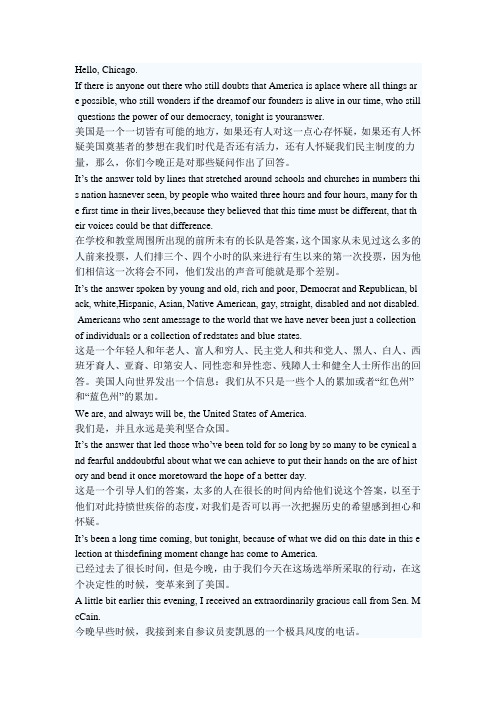
Hello, Chicago.If there is anyone out there who still doubts that America is aplace where all things ar e possible, who still wonders if the dreamof our founders is alive in our time, who still questions the power of our democracy, tonight is youranswer.美国是一个一切皆有可能的地方,如果还有人对这一点心存怀疑,如果还有人怀疑美国奠基者的梦想在我们时代是否还有活力,还有人怀疑我们民主制度的力量,那么,你们今晚正是对那些疑问作出了回答。
It’s the answer told by lines that stretched around schools and churches in numbers thi s nation hasnever seen, by people who waited three hours and four hours, many for th e first time in their lives,because they believed that this time must be different, that th eir voices could be that difference.在学校和教堂周围所出现的前所未有的长队是答案,这个国家从未见过这么多的人前来投票,人们排三个、四个小时的队来进行有生以来的第一次投票,因为他们相信这一次将会不同,他们发出的声音可能就是那个差别。
It’s the answer spoken by young and old, rich and poor, Democrat and Republican, bl ack, white,Hispanic, Asian, Native American, gay, straight, disabled and not disabled. Americans who sent amessage to the world that we have never been just a collection of individuals or a collection of redstates and blue states.这是一个年轻人和年老人、富人和穷人、民主党人和共和党人、黑人、白人、西班牙裔人、亚裔、印第安人、同性恋和异性恋、残障人士和健全人士所作出的回答。
奥巴马就职演说(obama victory speech)
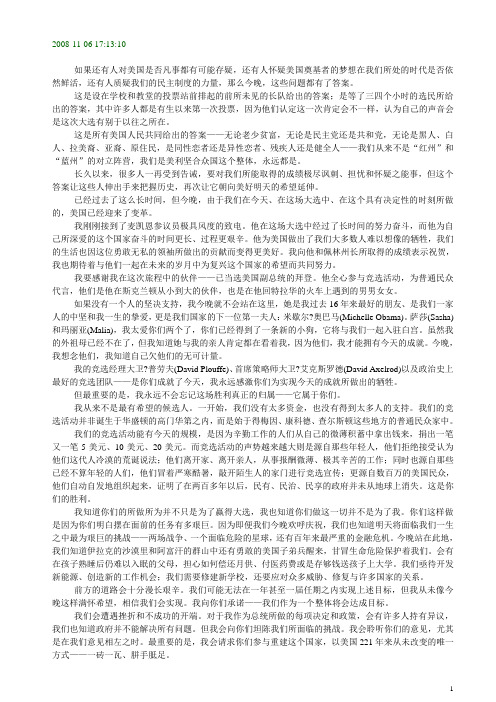
2008-11-06 17:13:10如果还有人对美国是否凡事都有可能存疑,还有人怀疑美国奠基者的梦想在我们所处的时代是否依然鲜活,还有人质疑我们的民主制度的力量,那么今晚,这些问题都有了答案。
这是设在学校和教堂的投票站前排起的前所未见的长队给出的答案;是等了三四个小时的选民所给出的答案,其中许多人都是有生以来第一次投票,因为他们认定这一次肯定会不一样,认为自己的声音会是这次大选有别于以往之所在。
这是所有美国人民共同给出的答案——无论老少贫富,无论是民主党还是共和党,无论是黑人、白人、拉美裔、亚裔、原住民,是同性恋者还是异性恋者、残疾人还是健全人——我们从来不是“红州”和“蓝州”的对立阵营,我们是美利坚合众国这个整体,永远都是。
长久以来,很多人一再受到告诫,要对我们所能取得的成绩极尽讽刺、担忧和怀疑之能事,但这个答案让这些人伸出手来把握历史,再次让它朝向美好明天的希望延伸。
已经过去了这么长时间,但今晚,由于我们在今天、在这场大选中、在这个具有决定性的时刻所做的,美国已经迎来了变革。
我刚刚接到了麦凯恩参议员极具风度的致电。
他在这场大选中经过了长时间的努力奋斗,而他为自己所深爱的这个国家奋斗的时间更长、过程更艰辛。
他为美国做出了我们大多数人难以想像的牺牲,我们的生活也因这位勇敢无私的领袖所做出的贡献而变得更美好。
我向他和佩林州长所取得的成绩表示祝贺,我也期待着与他们一起在未来的岁月中为复兴这个国家的希望而共同努力。
我要感谢我在这次旅程中的伙伴——已当选美国副总统的拜登。
他全心参与竞选活动,为普通民众代言,他们是他在斯克兰顿从小到大的伙伴,也是在他回特拉华的火车上遇到的男男女女。
如果没有一个人的坚决支持,我今晚就不会站在这里,她是我过去16年来最好的朋友、是我们一家人的中坚和我一生的挚爱,更是我们国家的下一位第一夫人:米歇尔?奥巴马(Michelle Obama)。
萨莎(Sasha)和玛丽亚(Malia),我太爱你们两个了,你们已经得到了一条新的小狗,它将与我们一起入驻白宫。
2008年奥巴马竞选演讲稿(中英)

刚才,麦凯恩参议员很有风度地给我打了个电话。在这次竞选中,他的努力持久而艰巨。为了这个他挚爱的国家,他的努力更持
久、更艰巨。他为美国的奉献超出绝大多数人的想象。他是一位
勇敢无私的领袖,有了他的奉献,我们的生活才更美好。我对他
Native American, gay, straight, disabled and not
disabled — Americans who sent a message to the world
that we have never been a collection of red states and
It's the answer told by lines that stretched around schools and churches in numbers this nation has never
seen; by people who waited three hours and four hours,
service rendered by this brave and selfless leader. I
congratulate him and Gov. Palin for all they have
achieved, and I look forward to working with them to
many for the very first time in their lives, because
they believed that this time must be different; that
2008竞选成功演讲

非洲生意记录非洲工作生活2009-01-20 19:09 奥巴马就职演讲稿中英文对照(1月20号)下面是奥巴马就职演讲稿中英文对照下载奥巴马就职演讲音频和视频(CNN) -- Barack Obama was sworn in as the 44th president of the United States and the nation's first African-American president Tuesday. This is a transcript of his prepared speech.In his speech Tuesday, President Obama said America must play its role in ushering in a new era of peace.My fellow citizens:I stand here today humbled by the task before us, grateful for the trust you have bestowed, mindful of the sacrifices borne by our ancestors. I thank President Bush for his service to our nation, as well as the generosity and cooperation he has shown throughout this transition.Forty-four Americans have now taken the presidential oath. The words have been spoken during rising tides of prosperity and the still waters of peace. Yet, every so often, the oath is taken amidst gathering clouds and raging storms. At these moments, America has carried on not simply because of the skill or vision of those in high office, but because We the People have remained faithful to the ideals of our forebearers, and true to our founding documents.So it has been. So it must be with this generation of Americans.That we are in the midst of crisis is now well understood. Our nation is at war, against a far-reaching network of violence and hatred. Our economy is badly weakened, a consequence of greed and irresponsibility on the part of some, but also our collective failure to make hard choices and prepare the nation for a new age. Homes have been lost; jobs shed; businesses shuttered. Our health care is too costly; our schools fail too many; and each day brings further evidence that the ways we use energy strengthen our adversaries and threaten our planet. These are the indicators of crisis, subject to data and statistics. Less measurable but no less profound is a sapping of confidence across our land -- a nagging fear that America's decline is inevitable, and that the next generation must lower its sights.Today I say to you that the challenges we face are real. They are serious and they are many. They will not be met easily or in a short span of time. But know this, America: They will be met.On this day, we gather because we have chosen hope over fear, unity of purpose over conflict and discord.On this day, we come to proclaim an end to the petty grievances and false promises, the recriminations and worn-out dogmas, that for far too long have strangled our politics.We remain a young nation, but in the words of Scripture, the time has come to set aside childish things. The time has come to reaffirm our enduring spirit; to choose our better history; to carry forward that precious gift, that noble idea, passed on from generation to generation: the God-given promise that all are equal, all are free, and all deserve a chance to pursue their full measure of happiness.In reaffirming the greatness of our nation, we understand that greatness is never a given. It must be earned. Our journey has never been one of shortcuts or settling for less. It has not been the path for the fainthearted -- for those who prefer leisure over work, or seek only the pleasures ofriches and fame. Rather, it has been the risk-takers, the doers, the makers of things -- some celebrated, but more often men and women obscure in their labor -- who have carried us up the long, rugged path toward prosperity and freedom.For us, they packed up their few worldly possessions and traveled across oceans in search of a new life.For us, they toiled in sweatshops and settled the West; endured the lash of the whip and plowed the hard earth.For us, they fought and died, in places like Concord and Gettysburg; Normandy and KheSahn. Time and again, these men and women struggled and sacrificed and worked till their hands were raw so that we might live a better life. They saw America as bigger than the sum of our individual ambitions; greater than all the differences of birth or wealth or faction.This is the journey we continue today. We remain the most prosperous, powerful nation on Earth. Our workers are no less productive than when this crisis began. Our minds are no less inventive, our goods and services no less needed than they were last week or last month or last year. Our capacity remains undiminished. But our time of standing pat, of protecting narrow interests and putting off unpleasant decisions -- that time has surely passed. Starting today, we must pick ourselves up, dust ourselves off, and begin again the work of remaking America.For everywhere we look, there is work to be done. The state of the economy calls for action, bold and swift, and we will act -- not only to create new jobs, but to lay a new foundation for growth. We will build the roads and bridges, the electric grids and digital lines that feed our commerce and bind us together. We will restore science to its rightful place, and wield technology's wonders to raise health care's quality and lower its cost. We will harness the sun and the winds and the soil to fuel our cars and run our factories. And we will transform our schools and colleges and universities to meet the demands of a new age. All this we can do. And all this we will do. Now, there are some who question the scale of our ambitions -- who suggest that our system cannot tolerate too many big plans. Their memories are short. For they have forgotten what this country has already done; what free men and women can achieve when imagination is joined to common purpose, and necessity to courage.What the cynics fail to understand is that the ground has shifted beneath them -- that the stale political arguments that have consumed us for so long no longer apply. The question we ask today is not whether our government is too big or too small, but whether it works -- whether it helps families find jobs at a decent wage, care they can afford, a retirement that is dignified. Where the answer is yes, we intend to move forward. Where the answer is no, programs will end. And those of us who manage the public's dollars will be held to account -- to spend wisely, reform bad habits, and do our business in the light of day -- because only then can we restore the vital trust between a people and their government.Nor is the question before us whether the market is a force for good or ill. Its power to generate wealth and expand freedom is unmatched, but this crisis has reminded us that without a watchful eye, the market can spin out of control -- and that a nation cannot prosper long when it favors only the prosperous. The success of our economy has always depended not just on the size of our gross domestic product, but on the reach of our prosperity; on our ability to extend opportunity to every willing heart -- not out of charity, but because it is the surest route to our common good.As for our common defense, we reject as false the choice between our safety and our ideals. OurFounding Fathers, faced with perils we can scarcely imagine, drafted a charter to assure the rule of law and the rights of man, a charter expanded by the blood of generations. Those ideals still light the world, and we will not give them up for expedience's sake. And so to all other peoples and governments who are watching today, from the grandest capitals to the small village where my father was born: Know that America is a friend of each nation and every man, woman and child who seeks a future of peace and dignity, and that we are ready to lead once more.Recall that earlier generations faced down fascism and communism not just with missiles and tanks, but with sturdy alliances and enduring convictions. They understood that our power alone cannot protect us, nor does it entitle us to do as we please. Instead, they knew that our power grows through its prudent use; our security emanates from the justness of our cause, the force of our example, the tempering qualities of humility and restraint.We are the keepers of this legacy. Guided by these principles once more, we can meet those new threats that demand even greater effort -- even greater cooperation and understanding between nations. We will begin to responsibly leave Iraq to its people, and forge a hard-earned peace in Afghanistan. With old friends and former foes, we will work tirelessly to lessen the nuclear threat, and roll back the specter of a warming planet. We will not apologize for our way of life, nor will we waver in its defense, and for those who seek to advance their aims by inducing terror and slaughtering innocents, we say to you now that our spirit is stronger and cannot be broken; you cannot outlast us, and we will defeat you.For we know that our patchwork heritage is a strength, not a weakness. We are a nation of Christians and Muslims, Jews and Hindus -- and nonbelievers. We are shaped by every language and culture, drawn from every end of this Earth; and because we have tasted the bitter swill of civil war and segregation, and emerged from that dark chapter stronger and more united, we cannot help but believe that the old hatreds shall someday pass; that the lines of tribe shall soon dissolve; that as the world grows smaller, our common humanity shall reveal itself; and that America must play its role in ushering in a new era of peace.To the Muslim world, we seek a new way forward, based on mutual interest and mutual respect. To those leaders around the globe who seek to sow conflict, or blame their society's ills on the West: Know that your people will judge you on what you can build, not what you destroy. To those who cling to power through corruption and deceit and the silencing of dissent, know that you are on the wrong side of history; but that we will extend a hand if you are willing to unclench your fist.To the people of poor nations, we pledge to work alongside you to make your farms flourish and let clean waters flow; to nourish starved bodies and feed hungry minds. And to those nations like ours that enjoy relative plenty, we say we can no longer afford indifference to suffering outside our borders; nor can we consume the world's resources without regard to effect. For the world has changed, and we must change with it.As we consider the road that unfolds before us, we remember with humble gratitude those brave Americans who, at this very hour, patrol far-off deserts and distant mountains. They have something to tell us today, just as the fallen heroes who lie in Arlington whisper through the ages. We honor them not only because they are guardians of our liberty, but because they embody the spirit of service; a willingness to find meaning in something greater than themselves. And yet, at this moment -- a moment that will define a generation -- it is precisely this spirit that must inhabit us all.For as much as government can do and must do, it is ultimately the faith and determination of the American people upon which this nation relies. It is the kindness to take in a stranger when the levees break, the selflessness of workers who would rather cut their hours than see a friend lose their job which sees us through our darkest hours. It is the firefighter's courage to storm a stairway filled with smoke, but also a parent's willingness to nurture a child, that finally decides our fate.Our challenges may be new. The instruments with which we meet them may be new. But those values upon which our success depends -- hard work and honesty, courage and fair play, tolerance and curiosity, loyalty and patriotism -- these things are old. These things are true. They have been the quiet force of progress throughout our history. What is demanded then is a return to these truths. What is required of us now is a new era of responsibility -- a recognition, on the part of every American, that we have duties to ourselves, our nation and the world; duties that we do not grudgingly accept but rather seize gladly, firm in the knowledge that there is nothing so satisfying to the spirit, so defining of our character, than giving our all to a difficult task.This is the price and the promise of citizenship.This is the source of our confidence -- the knowledge that God calls on us to shape an uncertain destiny.This is the meaning of our liberty and our creed -- why men and women and children of every race and every faith can join in celebration across this magnificent Mall, and why a man whose father less than 60 years ago might not have been served at a local restaurant can now stand before you to take a most sacred oath.So let us mark this day with remembrance, of who we are and how far we have traveled. In the year of America's birth, in the coldest of months, a small band of patriots huddled by dying campfires on the shores of an icy river. The capital was abandoned. The enemy was advancing. The snow was stained with blood. At a moment when the outcome of our revolution was most in doubt, the father of our nation ordered these words be read to the people:"Let it be told to the future world ... that in the depth of winter, when nothing but hope and virtue could survive... that the city and the country, alarmed at one common danger, came forth to meet [it]."America. In the face of our common dangers, in this winter of our hardship, let us remember these timeless words. With hope and virtue, let us brave once more the icy currents, and endure what storms may come. Let it be said by our children's children that when we were tested, we refused to let this journey end, that we did not turn back, nor did we falter; and with eyes fixed on the horizon and God's grace upon us, we carried forth that great gift of freedom and delivered it safely to future generations.奥巴马就职演讲中文版(供参考)各位同胞:今天我站在这里,为眼前的重责大任感到谦卑,对各位的信任心怀感激,对先贤的牺牲铭记在心。
08年美国总统大选胜选奥巴马演讲全文美国的变革
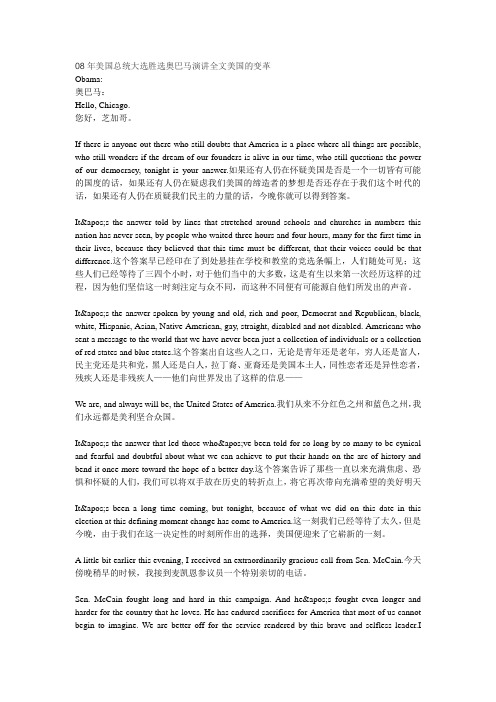
08年美国总统大选胜选奥巴马演讲全文美国的变革Obama:奥巴马:Hello, Chicago.您好,芝加哥。
If there is anyone out there who still doubts that America is a place where all things are possible, who still wonders if the dream of our founders is alive in our time, who still questions the power of our democracy, tonight is your answer.如果还有人仍在怀疑美国是否是一个一切皆有可能的国度的话,如果还有人仍在疑虑我们美国的缔造者的梦想是否还存在于我们这个时代的话,如果还有人仍在质疑我们民主的力量的话,今晚你就可以得到答案。
It's the answer told by lines that stretched around schools and churches in numbers this nation has never seen, by people who waited three hours and four hours, many for the first time in their lives, because they believed that this time must be different, that their voices could be that difference.这个答案早已经印在了到处悬挂在学校和教堂的竞选条幅上,人们随处可见;这些人们已经等待了三四个小时,对于他们当中的大多数,这是有生以来第一次经历这样的过程,因为他们坚信这一时刻注定与众不同,而这种不同便有可能源自他们所发出的声音。
名人竞选故事
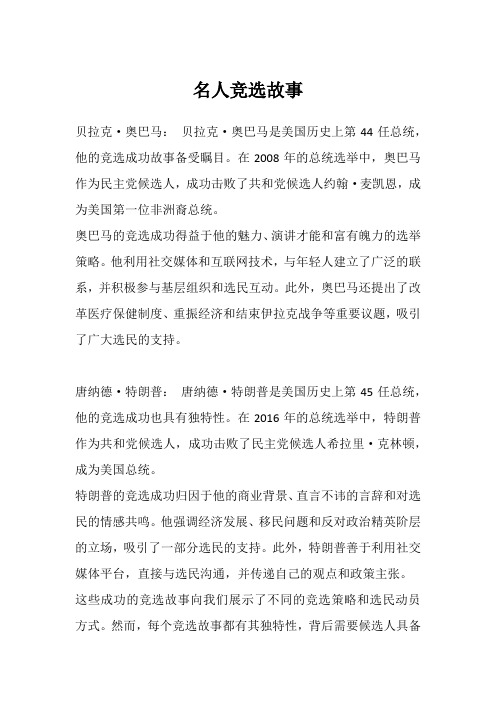
名人竞选故事
贝拉克·奥巴马:贝拉克·奥巴马是美国历史上第44任总统,他的竞选成功故事备受瞩目。
在2008年的总统选举中,奥巴马作为民主党候选人,成功击败了共和党候选人约翰·麦凯恩,成为美国第一位非洲裔总统。
奥巴马的竞选成功得益于他的魅力、演讲才能和富有魄力的选举策略。
他利用社交媒体和互联网技术,与年轻人建立了广泛的联系,并积极参与基层组织和选民互动。
此外,奥巴马还提出了改革医疗保健制度、重振经济和结束伊拉克战争等重要议题,吸引了广大选民的支持。
唐纳德·特朗普:唐纳德·特朗普是美国历史上第45任总统,他的竞选成功也具有独特性。
在2016年的总统选举中,特朗普作为共和党候选人,成功击败了民主党候选人希拉里·克林顿,成为美国总统。
特朗普的竞选成功归因于他的商业背景、直言不讳的言辞和对选民的情感共鸣。
他强调经济发展、移民问题和反对政治精英阶层的立场,吸引了一部分选民的支持。
此外,特朗普善于利用社交媒体平台,直接与选民沟通,并传递自己的观点和政策主张。
这些成功的竞选故事向我们展示了不同的竞选策略和选民动员方式。
然而,每个竞选故事都有其独特性,背后需要候选人具备
领导能力、魅力和与选民建立联系的能力。
美国总统选举电视辩论趣事.doc

美国总统选举电视辩论趣事美国总统候选人在电视辩论时的形象、表情、言行、举止,都备受关注,甚至可以成为影响支持率的重要因素之一,一点都马虎不得。
举一反三,我们在参加辩论赛时,也需吸取尼克松和老布什的教训,莫要因小失大。
美国总统选举电视辩论趣事两则2008年美国总统大选期间,总统候选人奥巴马和麦凯恩之间的三场电视辩论,让不少中国观众大开眼界。
其实,电视辩论在美国由来已久,逸闻趣事更是不少,本文就选取了两则,与广大读者分享。
辩论趣事一1960年9月26日,美国举行了历史上第一次总统选举电视辩论,两位主角分别是肯尼迪和尼克松,全国有700万人收看了这场直播。
在此之前,两人的支持率旗鼓相当,但在电视辩论之后,尼克松的支持率却直线下降。
原来,电视台为了直播效果好,加强了舞台灯光;为了让候选人看起来精神抖擞,要求候选人站立辩论。
肯尼迪事先了解到这一点,预料到灯光加强,现场温度肯定升高,便在比赛时,穿了身较薄的西服。
而怕热、刚刚因脚伤住院两周的尼克松却忽视了这些信息。
比赛当天,尼克松不但拒绝化妆,甚至连胡子都没刮就走上了舞台;电视台也按照原计划,打开了所有的灯,将舞台照得恍如白昼,自然,舞台上的温度也特别高,尼克松只得在辩论中不停地拿手帕擦拭额头上的汗;并且,站了一段时间后,尼克松的刚痊愈的脚就开始隐隐作痛,表情也变得痛苦起来。
结果,电视观众们看到的尼克松连胡须也没有刮干净,形象十分邋遢;并且,脸色苍白,额头汗水清晰可见,不停地擦拭汗水的动作显得他十分紧张;甚至,表情也越来越痛苦,看起来十分疲惫。
而肯尼迪则不同,年轻英俊、仪态潇洒,整场辩论神情自若、游刃有余。
两相对比,观众心中有了判断,辩论结束后,肯尼迪的支持率直线上升。
尼克松万万想不到,自己会败在几个他压根儿就没注意的小问题上。
一场辩论下来,他在观众心中就成了形象邋遢、上台紧张、表情疲惫的代言人,如此印象,支持率又怎能不下降呢?可这事儿怨天怨地怨不了任何人,虽然说输的有些冤枉,可谁让他自己不注意呢?辩论趣事二1992年,美国总统候选人电视辩论首次引入市民大会的形式,先由盖洛普民调机构抽样选出一班未决定将票投给谁的选民做现场观众,再由他们直接向候选人提出问题,而电视辩论的舞台上,也移走了传统的讲坛,改为让候选人坐在高脚椅上辩论,并且可以随意走动,增加与观众的互动。
奥巴马芝加哥演讲稿

美国民主党总统候选人奥巴马2008年11月5日赢得美国大选,将成为美国历史上第一位黑人总统。
当晚在芝加哥出席庆祝晚会上以“美国的变革”为主题发表获胜演说,称“美国的变革时代已到来”。
Hello, Chicago. 您好,芝加哥。
there is anyone out there who still doubts that America is a place where all things are possible, who still wonders if the dream of our founders is alive in our time, who still questions the power of our democracy, tonight is your answer. 如果仍有人怀疑美国是否是一个能创造奇迹的国度的话,如果还有人仍在疑虑我们美国的缔造者的梦想是否还在我们这个时代存续的话,如果还有人仍在质疑我们民主的力量的话,那么,今晚就给你答案。
It's the answer told by lines that stretched around schools and churches in numbers this nation has never seen, by people who waited three hours and four hours, many for the first time in their lives, because they believed that this time must be different, that their voices could be that difference. 排起的长队就是答案:云集于学校和教堂周围的人们盛况空前,他们等待了三四个小时,其中许多人还是生平首次经历选举。
因为他们坚信:这次结果必定不同,这就是他们的心声。
奥巴马的总统竞选演讲稿
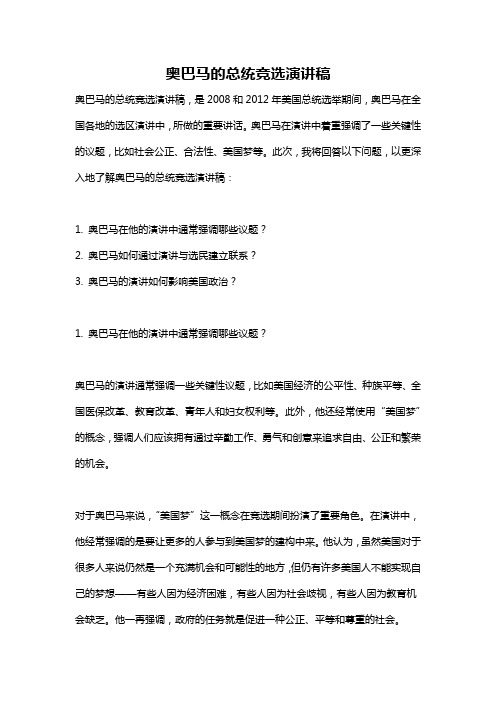
奥巴马的总统竞选演讲稿奥巴马的总统竞选演讲稿,是2008和2012年美国总统选举期间,奥巴马在全国各地的选区演讲中,所做的重要讲话。
奥巴马在演讲中着重强调了一些关键性的议题,比如社会公正、合法性、美国梦等。
此次,我将回答以下问题,以更深入地了解奥巴马的总统竞选演讲稿:1. 奥巴马在他的演讲中通常强调哪些议题?2. 奥巴马如何通过演讲与选民建立联系?3. 奥巴马的演讲如何影响美国政治?1. 奥巴马在他的演讲中通常强调哪些议题?奥巴马的演讲通常强调一些关键性议题,比如美国经济的公平性、种族平等、全国医保改革、教育改革、青年人和妇女权利等。
此外,他还经常使用“美国梦”的概念,强调人们应该拥有通过辛勤工作、勇气和创意来追求自由、公正和繁荣的机会。
对于奥巴马来说,“美国梦”这一概念在竞选期间扮演了重要角色。
在演讲中,他经常强调的是要让更多的人参与到美国梦的建构中来。
他认为,虽然美国对于很多人来说仍然是一个充满机会和可能性的地方,但仍有许多美国人不能实现自己的梦想——有些人因为经济困难,有些人因为社会歧视,有些人因为教育机会缺乏。
他一再强调,政府的任务就是促进一种公正、平等和尊重的社会。
2. 奥巴马如何通过演讲与选民建立联系?奥巴马在他的演讲中,很有一套“与选民建立联系”的方法。
他一方面强调自己个人的价值观和经历,与选民之间建立沟通和共鸣。
另一方面,他也经常使用各种手段来吸引选民的注意力,保持选民对自己的关注和支持。
比如,他经常根据不同的选区和受众来调整自己的演讲内容,以符合当地的需求和愿望。
他也善于使用幽默和讲故事的方式,来吸引听众的注意力,同时也强调自己和选民之间的共同点。
在演讲中,奥巴马还经常直接面对那些反对自己的人,或是对于他的议程怀有疑虑的人。
他试图通过说服和手段来消除不信任的因素,并尝试让他们了解自己的想法和计划的重要性。
此外,他还借助社交媒体的力量进行自我宣传,并不断利用技术手段来争取选民的支持和协助。
奥巴马08年竞选时在野餐会上的演说(中英)
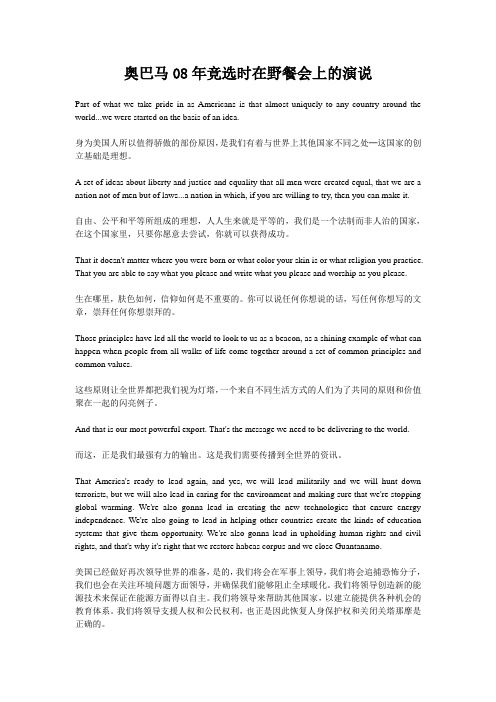
奥巴马08年竞选时在野餐会上的演说Part of what we take pride in as Americans is that almost uniquely to any country around the world...we were started on the basis of an idea.身为美国人所以值得骄傲的部份原因,是我们有着与世界上其他国家不同之处─这国家的创立基础是理想。
A set of ideas about liberty and justice and equality that all men were created equal, that we are a nation not of men but of laws...a nation in which, if you are willing to try, then you can make it.自由、公平和平等所组成的理想,人人生来就是平等的,我们是一个法制而非人治的国家,在这个国家里,只要你愿意去尝试,你就可以获得成功。
That it doesn't matter where you were born or what color your skin is or what religion you practice. That you are able to say what you please and write what you please and worship as you please.生在哪里,肤色如何,信仰如何是不重要的。
你可以说任何你想说的话,写任何你想写的文章,崇拜任何你想崇拜的。
Those principles have led all the world to look to us as a beacon, as a shining example of what can happen when people from all walks of life come together around a set of common principles and common values.这些原则让全世界都把我们视为灯塔,一个来自不同生活方式的人们为了共同的原则和价值聚在一起的闪亮例子。
奥巴马胜选演讲全文
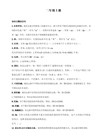
此情此景,等待尤长。然而,就在今晚,在这个大选的日子,在这个具有历史性意义的时刻,由于你们的付出,美国终于迎来了变革。
刚刚,我接到了麦凯恩参议员礼貌得体的祝贺电话。为了此次竞选,他奋战良久、竭尽所能;为了他所深爱的美国,他曾作出了更长久、更努力的奉献。麦凯恩参议员为美国所作出的牺牲是大部分人难以想象的,他这种英勇无私的奉献改善了我们的生活。对于麦凯恩参议员和佩林州长所取得的成就,我对他们致以祝贺。在接下来的几个月里,以重振美国为目标,我期待着与他们的合作。
对我的女儿,两位女儿,你们一天天在成长,你们成为了两位向你们的妈妈一样的淑女、美丽,有才华,我也为你们感到骄傲,但是目前我觉得给你们养一条宠物狗就够了。我还要感谢我的竞选团队和志愿者,他们是历史上最棒的。他们是最好的,最棒的,而且是史上最棒的。有些人是第一次来听我的演说,有些人四年前就听了我的获胜演说,但是每个人对我来讲都是我的一分子,不管你做了什么,不管你去了哪里,你一定会记得我们今天晚上所创的历史,你会一生都感激今天晚上的时刻,而且你们会一直记得有一个心怀感激的总统,我要感谢你们所做的每一件事情,正是因为有了你们,我才会一路坚持下来。我对此将永远感谢,不管你做的什么,你们所做的一切我都心怀感激,并且永远鸣谢。
前方的道路很漫长,我们将步履维艰。我们也许无法在一年内,甚至是(我的)一个任期内,达成我们的目标。但是,今晚,我比任何时候都对此更有信心。我承诺,我们所有人将作为一个整体顺利的到达目的地。
我们将不可避免地遭遇许多挫折,也许开头并不会一帆风顺。我们需要弄明白一点,那就是政府无法解决所有的问题,也许有很多人不会同意我上台执政后制定的政策。不过,我将坦诚地接受各方的批评,直面我们的挑战。我将倾听你们的意见,尤其是不同的政见。总之,我邀请各位一同投入到国家的建设中来,用我们勤劳的双手堆砌建设这个国家所需的砖瓦。正是这一方式,使美国在221年的建国道路上不断前行。
奥巴马的演讲艺术收录08年和12年胜选演讲全文
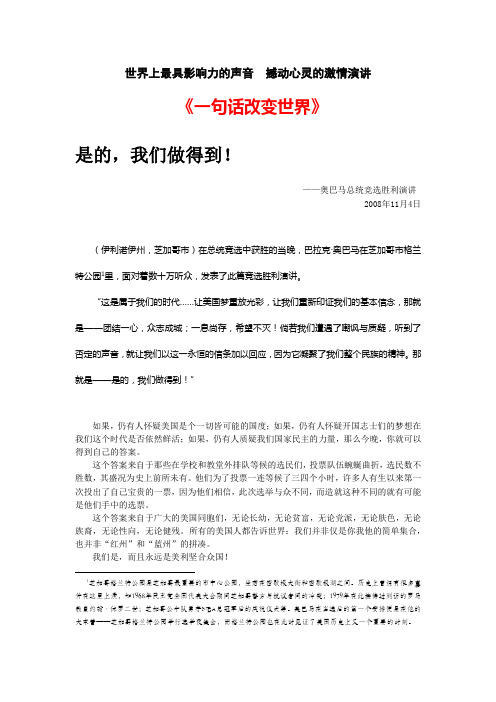
世界上最具影响力的声音撼动心灵的激情演讲《一句话改变世界》是的,我们做得到!——奥巴马总统竞选胜利演讲2008年11月4日(伊利诺伊州,芝加哥市)在总统竞选中获胜的当晚,巴拉克·奥巴马在芝加哥市格兰特公园1里,面对着数十万听众,发表了此篇竞选胜利演讲。
“这是属于我们的时代……让美国梦重放光彩,让我们重新印证我们的基本信念,那就是——团结一心,众志成城;一息尚存,希望不灭!倘若我们遭遇了嘲讽与质疑,听到了否定的声音,就让我们以这一永恒的信条加以回应,因为它凝聚了我们整个民族的精神。
那就是——是的,我们做得到!”如果,仍有人怀疑美国是个一切皆可能的国度;如果,仍有人怀疑开国志士们的梦想在我们这个时代是否依然鲜活;如果,仍有人质疑我们国家民主的力量,那么今晚,你就可以得到自己的答案。
这个答案来自于那些在学校和教堂外排队等候的选民们,投票队伍蜿蜒曲折,选民数不胜数,其盛况为史上前所未有。
他们为了投票一连等候了三四个小时,许多人有生以来第一次投出了自己宝贵的一票,因为他们相信,此次选举与众不同,而造就这种不同的就有可能是他们手中的选票。
这个答案来自于广大的美国同胞们,无论长幼,无论贫富,无论党派,无论肤色,无论族裔,无论性向,无论健残。
所有的美国人都告诉世界:我们并非仅是你我他的简单集合,也并非“红州”和“蓝州”的拼凑。
我们是,而且永远是美利坚合众国!1芝加哥格兰特公园是芝加哥最重要的市中心公园,坐落在密歇根大街和密歇根湖之间。
历史上曾经有很多事件在这里上演,如1968年民主党全国代表大会期间芝加哥警方与抗议者间的冲突;1979年在此接待过到访的罗马教皇约翰·保罗二世;芝加哥公牛队勇夺NBA总冠军后的庆祝仪式等。
奥巴马在当选后的第一个安排便是在他的大本营——芝加哥格兰特公园举行选举夜集会,而格兰特公园也在此时见证了美国历史上又一个重要的时刻。
这个答案来自于那些曾经愤世嫉俗、曾经恐惧担忧过的人们;世人的声音让他们惯于对我们所能取得的成就冷嘲热讽、顾虑重重。
奥巴马获胜演讲全文 2008
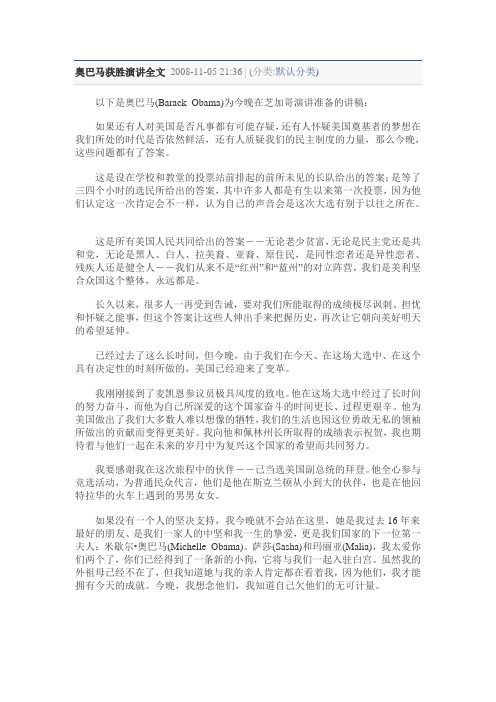
以下是奥巴马(Barack Obama)为今晚在芝加哥演讲准备的讲稿:如果还有人对美国是否凡事都有可能存疑,还有人怀疑美国奠基者的梦想在我们所处的时代是否依然鲜活,还有人质疑我们的民主制度的力量,那么今晚,这些问题都有了答案。
这是设在学校和教堂的投票站前排起的前所未见的长队给出的答案;是等了三四个小时的选民所给出的答案,其中许多人都是有生以来第一次投票,因为他们认定这一次肯定会不一样,认为自己的声音会是这次大选有别于以往之所在。
这是所有美国人民共同给出的答案--无论老少贫富,无论是民主党还是共和党,无论是黑人、白人、拉美裔、亚裔、原住民,是同性恋者还是异性恋者、残疾人还是健全人--我们从来不是“红州”和“蓝州”的对立阵营,我们是美利坚合众国这个整体,永远都是。
长久以来,很多人一再受到告诫,要对我们所能取得的成绩极尽讽刺、担忧和怀疑之能事,但这个答案让这些人伸出手来把握历史,再次让它朝向美好明天的希望延伸。
已经过去了这么长时间,但今晚,由于我们在今天、在这场大选中、在这个具有决定性的时刻所做的,美国已经迎来了变革。
我刚刚接到了麦凯恩参议员极具风度的致电。
他在这场大选中经过了长时间的努力奋斗,而他为自己所深爱的这个国家奋斗的时间更长、过程更艰辛。
他为美国做出了我们大多数人难以想像的牺牲,我们的生活也因这位勇敢无私的领袖所做出的贡献而变得更美好。
我向他和佩林州长所取得的成绩表示祝贺,我也期待着与他们一起在未来的岁月中为复兴这个国家的希望而共同努力。
我要感谢我在这次旅程中的伙伴--已当选美国副总统的拜登。
他全心参与竞选活动,为普通民众代言,他们是他在斯克兰顿从小到大的伙伴,也是在他回特拉华的火车上遇到的男男女女。
如果没有一个人的坚决支持,我今晚就不会站在这里,她是我过去16年来最好的朋友、是我们一家人的中坚和我一生的挚爱,更是我们国家的下一位第一夫人:米歇尔•奥巴马(Michelle Obama)。
萨莎(Sasha)和玛丽亚(Malia),我太爱你们两个了,你们已经得到了一条新的小狗,它将与我们一起入驻白宫。
奥巴马08年总统大选获胜演讲中英文【10】

奥巴马08年总统大选获胜演讲中英文【10】america, we have come so far. we have seen so much. but there is so much more to do. so tonight, let us ask ourselves - if our children should live to see the next century; if my daughters should be so lucky to live as long as ann nixon cooper, what change will they see? what progress will we have made?this is our chance to answer that call. this is our moment. this is our time - to put our people back to work and open doors of opportunity for our kids; to restore prosperity and promote the cause of peace; to reclaim the american dream and reaffirm that fundamental truth - that out of many, we are one; that while we breathe, we hope, and where we are met with cynicism, and doubt, and those who tell us that we can't, we will respond with that timeless creed that sums up the spirit of a people: yes we can. thank you, god bless you, and may god bless the united states of america.以下是奥巴马(barack obama)奥巴马08年总统大选获胜演讲中文翻译全文:。
美国总统大选奥巴马罗姆尼辩论稿

(APPLAUSE) JIM LEHRER: Thirty seconds, folks. Let's have a terrific evening, for all of you and for our country. Good evening from the Magness Arena at the University of Denver in Denver, Colorado. I'm Jim Lehrer of the "PBS News Hour," and I welcome you to the first of the 2012 presidential debates between President Barack Obama, the Democratic nominee, and former Massachusetts Governor Mitt Romney, the Republican nominee.This debate and the next three -- two presidential, one vice presidential -- are sponsored by the Commission on Presidential Debates. Tonight's 90 minutes will be about domestic issues and will follow a format designed by the commission. There will be six roughly 15-minute segments with two-minute answers for the first question, then open discussion for the remainder of each segment. Thousands of people offered suggestions on segment subjects or questions via the Internet and other means, but I made the final selections. And for the record, they were not submitted for approval to the commission or the candidates. The segments as I announced in advance will be three on the economy and one each on health care, the role of government and governing, with an emphasis throughout on differences, specifics and choices. Both candidates will also have two-minute closing statements. The audience here in the hall has promised to remain silent -- no cheers, applause, boos, hisses, among other noisy distracting things, so we may all concentrate on what the candidates have to say. There is a noise exception right now, though, as we welcome President Obama and Governor Romney. (APPLAUSE) Gentlemen, welcome to you both. Let's start the economy, segment one, and let's begin with jobs. What are the major differences between the two of you about how you would go about creating new jobs?You have two minutes. Each of you have two minutes to start. A coin toss has determined, Mr. President, you go first.PRESIDENT OBAMA: Well, thank you very much, Jim, for this opportunity. I want to thank Governor Romney and the University of Denver for your hospitality. There are a lot of points I want to make tonight, but the most important one is that 20 years ago I became the luckiest man on Earth because Michelle Obama agreed to marry me. And so I just want to wish, Sweetie, you happy anniversary and let you know that a year from now we will not be celebrating it in front of 40 million people. (LAUGHTER) You know, four yearsago we went through the worst financial crisis since the Great Depression. Millions of jobs were lost, the auto industry was on the brink of collapse. The financial system had frozen up. And because of the resilience and the determination of the American people, we've begun to fight our way back. Over the last 30 months, we've seen 5 million jobs in the private sector created. The auto industry has come roaring back. And housing has begun to rise. But we all know that we've still got a lot of work to do. And so the question here tonight is not where we've been, but where we're going. Governor Romney has a perspective that says if we cut taxes, skewed towards the wealthy, and roll back regulations, that we'll be better off. I've got a different view. I think we've got to invest in education and training. I think it's important for us to develop new sources of energy here in America, that we change our tax code to make sure that we're helping small businesses and companies that are investing here in the United States, that we take some of the money that we're saving as we wind down two wars to rebuild America and that we reduce our deficit in a balanced way that allows us to make these critical investments. Now, it ultimately is going to be up to the voters, to you, which path we should take. Are we going to double-down on the top-down economic policies that helped to get us into this mess? Or do we embrace a new economic patriotism that says America does best when the middle class does best? And I'm looking forward to having that debate.LEHRER: Governor Romney, two minutes.GOV. MITT ROMNEY: Thank you, Jim. It's an honor to be here with you, and I appreciate the chance to be with the president. I'm pleased to be at the University of Denver, appreciate their welcome, and also the presidential commission on these debates. And congratulations to you, Mr. President, on your anniversary. I'm sure this was the most romantic place you could imagine here -- here with me. So I... (LAUGHTER) Congratulations. This is obviously a very tender topic. I've had the occasion over the last couple of years of meeting people across the country. I was in Dayton, Ohio, and a woman grabbed my arm, and she said, "I've been out of work since May. Can you help me?" Ann yesterday was at a rally in Denver, and a woman came up to her with a baby in her arms, and said, "Ann, my husband has had four jobs in three years,part-time jobs. He's lost his most recent job. And we've now just lost our home. Can you help us?" And the answer is, yes, we can help, but it's going to take adifferent path, not the one we've been on, not the one the president describes as a top-down, cut taxes for the rich. That's not what I'm going to do. My plan has five basic parts. One, get us energy independent, North American energy independent. That creates about 4 million jobs. Number two, open up more trade, particularly in Latin America, crack down on China, if and when they cheat. Number three, make sure our people have the skills they need to succeed and the best schools in the world. We're a far way from that now. Number four, get us to a balanced budget. Number five, champion small business. It's small business that creates the jobs in America. And over the last four years, small- business people have decided that America may not be the place to open a new business, because new business startups are down to a 30-year low. I know what it takes to get small business growing again, to hire people.ROMNEY: Now, I'm concerned that the path that we're on has just been unsuccessful. The president has a view very similar to the view he had when he ran four years, that a bigger government, spending more, taxing more, regulating more -- if you will, trickle-down government -- would work. That's not the right answer for America. I'll restore the vitality that gets America working again. Thank you. LEHRER: Mr. President, please respond directly to what the governor just said about trickle-down -- his trick-down approach, as he said yours is. OBAMA: Well, let me talk specifically about what I think we need to do. First, we've got to improve our education system and we've made enormous progress drawing on ideas both from Democrats and Republicans that are already starting to show gains in some of the toughest to deal with schools. We've got a program called Race to the Top that has prompted reforms in 46 states around the country, raising standards, improving how we train teachers. So now I want to hire another 100,000 new math and science teachers, and create 2 million more slots in our community colleges so that people can get trained for the jobs that are out there right now. And I want to make sure that we keep tuition low for our young people. When it comes to our tax code, Governor Romney and I both agree that our corporate tax rate is too high, so I want to lower it, particularly for manufacturing, taking it down to 25 percent. But I also want to close those loopholes that are giving incentives for companies that are shipping jobs overseas. I want to provide tax breaks for companies that are investing here in the United States. On energy, Governor Romney and I, we both agree that we've got to boost American energy production, and oil and natural gas production are higher than they've been inyears. But I also believe that we've got to look at the energy sources of the future, like wind and solar and biofuels, and make those investments. So all of this is possible. Now, in order for us to do it, we do have to close our deficit, and one of the things I'm sure we'll be discussing tonight is, how do we deal with our tax code? And how do we make sure that we are reducing spending in a responsible way, but also, how do we have enough revenue to make those investments? And this is where there's a difference, because Governor Romney's central economic plan calls for a $5 trillion tax cut -- on top of the extension of the Bush tax cuts -- that's another trillion dollars -- and $2 trillion in additional military spending that the military the deficit, and make the investments that we need to make, without dumping those costs ontomiddle-class Americans, I think is one of the central questions of this campaign. LEHRER: Both of you have spoken about a lot of different things, and we're going to try to get through them in as specific a way as we possibly can. But, first, Governor Romney, do you have a question that you'd like to ask the president directly about something he just said? ROMNEY: Well, sure. I'd like to clear up the record and go through it piece by piece. First of all, I don't have a $5 trillion tax cut. I don't have a tax cut of a scale that you're talking about. My view is that we ought to provide tax relief to people in the middle class. But I'm not going to reduce the share of taxes paid by high-income people. High-income people are doing just fine in this economy. They'll do fine whether you're president or I am. The people who are having the hard time right now are middle- income Americans. Under the president's policies, middle-income Americans have been buried. They're just being crushed. Middle- income Americans have seen their income come down by $4,300. This is a -- this is a tax in and of itself. I'll call it the economy tax. It's been crushing. At the same time, gasoline prices have doubled under the president. Electric rates are up. Food prices are up. Health care costs have gone up by $2,500 a family. Middle-income families are being crushed.ROMNEY: And so the question is how to get them going again. And I've described it. It's energy and trade, the right kind of training programs, balancing our budget and helping small business. Those are the -- the cornerstones of my plan. But the president mentioned a couple of other ideas I'll just note. First, education. I agree: Education is key, particularly the future of our economy. But our training programs right now, we've got 47 of them, housed in the federal government, reporting to eight different agencies.Overhead is overwhelming. We've got to get those dollars back to the states and go to the workers so they can create their own pathways to get in the training they need for jobs that will really help them. The second area, taxation, we agree, we ought to bring the tax rates down. And I do, both for corporations and for individuals. But in order for us not to lose revenue, have the government run out of money, I also lower deductions and credits and exemptions, so that we keep taking in the same money when you also account for growth. The third area, energy. Energy is critical, and the president pointed out correctly that production of oil and gas in the U.S. is up. But not due to his policies. In spite of his policies. Mr. President, all of the increase in natural gas and oil has happened on private land, not on government land. On government land, your administration has cut the number of permits and licenses in half. If I'm president, I'll double them, and also get the -- the oil from offshore and Alaska. And I'll bring that pipeline in from Canada. And, by the way, I like coal. I'm going to make sure we can continue to burn clean coal. People in the coal industry feel like it's getting crushed by your policies. I want to get America and North America energy independent so we can create those jobs. And finally, with regards to that tax cut, look, I'm not looking to cut massive taxes and to reduce the -- the revenues going to the government. My -- my number-one principal is, there will be no tax cut that adds to the deficit. I want to underline that: no tax cut that adds to the deficit. But I do want to reduce the burden being paid by middle-income Americans. And I -- and to do that, that also means I cannot reduce the burden paid by high-income Americans. So any -- any language to the contrary is simply not accurate. LEHRER: Mr. President? OBAMA: Well, I think -- let's talk about taxes, because I think it's instructive. Now, four years ago, when I stood on this stage, I said that I would cut taxes for middle-class families. And that's exactly what I did. We cut taxes for middle-class families by about $3,600. And the reason is, because I believe that we do best when the middle class is doing well. And by giving them those tax cuts, they had a little more money in their pocket, and so maybe they can buy a new car. They are certainly in a better position to weather the extraordinary recession that we went through. They can buy a computer for their kid who's going off to college, which means they're spending more money, businesses have more customers, businesses make more profits, and then hire more workers. Now, Governor Romney's proposal that he has been promoting for 18 months calls for a $5 trillion tax cut, on top of $2 trillion of additional spending for our military. And heis saying that he is going to pay for it by closing loopholes and deductions. The problem deductions and loopholes, and he hasn't been able to identify them. But I'm going to make an important point here, Jim. LEHRER: All right. OBAMA: When you add up all the loopholes and deductions that upper-income individuals can -- are currently taking advantage of, you take those all away, you don't come close to paying for $5 trillion in tax cuts and $2 trillion in additional military spending.OBAMA: And that's why independent studies looking at this said the only way to meet Governor Romney's pledge of not reducing the deficit or -- or -- or not adding to the deficit is by burdening middle-class families. The average middle-class family with children would pay about $2,000 more. Now, that's not my analysis. That's the analysis of economists who have looked at this. And -- and that kind of top -- top-down economics, where folks at the top are doing well, so the average person making $3 million is getting a $250,000 tax break, while middle-class families are burdened further, that's not what I believe is a recipe for economic growth. LEHRER: All right. What is the difference? Let's just stay on taxes. (CROSSTALK)LEHRER: Just -- let's just stay on taxes for (inaudible). (CROSSTALK)LEHRER: What is the difference...ROMNEY: Well, but -- but virtually -- virtually everything he just said about my tax plan is inaccurate.LEHRER: All right.ROMNEY: So if the tax plan he described were a tax plan I was trillion tax cut. What I've said is I won't put in place a tax cut that adds to the deficit. That's part one. So there's no economist that can say Mitt Romney's tax plan adds $5 trillion if I say I will not add to the deficit with my tax plan. Number two, I will not reduce the share paid by high-income individuals. I know that you and your running mate keep saying that and I know it's a popular thing to say with a lot of people, but it's just not the case. Look, I've got five boys. I'm used to people saying something that's not always true, but just keep on repeating it and ultimately hoping I'll believe it. But that -- that is not the case. All right? I will not reduce the taxes paid by high-income Americans. And number three, I will not under any circumstances raise taxes on middle-income families. I will lowertaxes on middle-income families. Now, you cite a study. There are six other studies that looked at the study you describe and say it's completely wrong. I saw a study that came out today that said you're going to raise taxes by $3,000 to $4,000 on middle-income families. There are all these studies out there. But let's get at the bottom line. That is, I want to bring down rates. I want to bring the rates down, at the same time lower deductions and exemptions and credits and so forth, so we keep getting the revenue we need. And you'd think, well, then why lower the rates? ROMNEY: And the reason is because small business pays that individual rate; 54 percent of America's workers work in businesses that are taxed not at the corporate tax rate, but at the individual tax rate. And if we lower that rate, they will be able to hire more people. For me, this is about jobs. This is about getting jobs for the American people. (CROSSTALK)LEHRER: That's where we started. Yeah. Do you challenge what the governor just said about his own plan?OBAMA: Well, for 18 months he's been running on this tax plan. And now, five weeks before the election, he's saying that his big, bold idea is, "Never mind." And the fact is that if you are lowering the rates the way you described, Governor, then it is not possible to come up with enough deductions and loopholes that only affect high-income individuals to avoid either raising the deficit or burdening the middle class. It's -- it's math. It's arithmetic. Now, Governor Romney and I do share a deep interest in encouraging small-business growth. So at the same time that my tax plan has already lowered taxes for 98 percent of families, I also lowered taxes for small businesses 18 times. And what I want to do is continue the tax rates -- the tax cuts that we put into place for small businesses and families. But I have said that for incomes over $250,000 a year, that we should go back to the rates that we had when Bill Clinton was president, when we created 23 million new jobs, went from deficit to surplus, and created a whole lot of millionaires to boot. And the reason this is important is because by doing that, we cannot only reduce the deficit, we cannot only encourage job growth through small businesses, but we're also able to make the investments that are necessary in education or in energy.And we do have a difference, though, when it comes to definitions of small business. Under -- under my plan, 97 percent of small businesses would not see their income taxes go up. Governor Romney says, well, those top 3 percent, they're the job creators, they'd be burdened. But under Governor Romney'sdefinition, there are a whole bunch of millionaires and billionaires who are small businesses. Donald Trump is a small business. Now, I know Donald Trump doesn't like to think of himself as small anything, but -- but that's how you define small businesses if you're getting business income. And that kind of approach, I believe, will not grow our economy, because the only way to pay for it without either burdening the middle class or blowing up our deficit is to make drastic cuts in things like education, making sure that we are continuing to invest in basic science and research, all the things that are helping America grow. And I think that would be a mistake. LEHRER: All right.ROMNEY: Jim, let me just come back on that -- on that point, which is these...LEHRER: Just for the -- just for record... (CROSSTALK)ROMNEY: ... the small businesses we're talking about...LEHRER: Excuse me. Excuse me. Just so everybody understands, we're way over our first 15 minutes.ROMNEY: It's fun, isn't it? LEHRER: It's OK, it's great. No problem. Well, you all don't have -- you don't have a problem, I don't have a problem, because we're still on the economy. We're going to come back to taxes. I want move on to the deficit and a lot of other things, too. OK, but go ahead, sir.ROMNEY: You bet. Well, President, you're -- Mr. President, you're absolutely right, which is that, with regards to 97 percent of the businesses are not -- not taxed at the 35 percent tax rate, they're taxed at a lower rate. But those businesses that are in the last 3 percent of businesses happen to employ half -- half of all the people who work in small business. Those are the businesses that employ one-quarter of all the workers in America. And your plan is to take their tax rate from 35 percent to 40 percent. Now, and -- and I've talked to a guy who has a very small business. He's in the electronics business in -- in St. Louis. He has four employees. He said he and his son calculated how much they pay in taxes, federal income tax, federal payroll tax, state income tax, state sales tax, state property tax, gasoline tax. It added up to well over 50 percent of what they earned. And your plan is to take the tax rate on successful small businesses from 35 percent to 40 percent. The National Federation of Independent Businesses has said that will cost 700,000 jobs. I don't want to cost jobs. My priority is jobs. And so what I do is I bring down the tax rates, lower deductionsand exemptions, the same idea behind Bowles-Simpson, by the way, get the rates down, lower deductions and exemptions, to create more jobs, because there's nothing better for getting us to a balanced budget than having more people working, earning more money, paying more taxes. That's by far the most effective and efficient way to get this budget balanced.OBAMA: Jim, I -- you may want to move onto another topic, but I -- I would just say this to the American people. If you believe that we can cut taxes by $5 trillion and add $2 trillion in additional spending that the military is not asking for, $7 trillion -- just to ROMNEY: We didn't put in place a board that can tell people ultimately what treatments they're going to receive. We didn't also do something that I think a number of people across this country recognize, which is put -- put people in a position where they're going to lose the insurance they had and they wanted. Right now, the CBO says up to 20 million people will lose their insurance as Obamacare goes into effect next year. And likewise, a study by McKinsey and Company of American businesses said 30 percent of them are anticipating dropping people from coverage. So for those reasons, for the tax, for Medicare, for this board, and for people losing their insurance, this is why the American people don't want Medicare -- don't want Obamacare. It's why Republicans said, do not do this, and the Republicans had -- had the plan. They put a plan out. They put out a plan, a bipartisan plan. It was swept aside. I think something this big, this important has to be done on a bipartisan basis. And we have to have a president who can reach across the aisle and fashion important legislation with the input from both parties. OBAMA: Governor Romney said this has to be done on a bipartisan basis. This was a bipartisan idea. In fact, it was a Republican idea. And Governor Romney at the beginning of this debate wrote and said what we did in Massachusetts could be a model for the nation. And I agree that the Democratic legislators in Massachusetts might have given some advice to Republicans in Congress about how to cooperate, but the fact of the matter is, we used the same advisers, and they say it's the same plan. It -- when Governor Romney talks about this board, for example, unelected board that we've created, what this is, is a group of health care experts, doctors, et cetera, to figure out, how can we reduce the cost of care in the system overall? Because there -- there are two ways of dealing with our health care crisis. One is to simply leave a whole bunch of people uninsured and let them fend for themselves, to let businesses figure out how long they can continue to pay premiums until finally they just give up, and their workers are no longer gettinginsured, and that's been the trend line. Or, alternatively, we can figure out, how do we make the cost of care more effective? And there are ways of doing it. So at Cleveland Clinic, one of the best health care systems in the world, they actually provide great care cheaper than average. And the reason they do is because they do some smart things. They -- they say, if a patient's coming in, let's get all the doctors together at once, do one test instead of having the patient run around with 10 tests. Let's make sure that we're providing preventive care so we're catching the onset of something like diabetes. Let's -- let's pay providers on the basis of performance as opposed to on the basis of how many procedures they've -- they've engaged in. Now, so what this board does is basically identifies best practices and says, let's use the purchasing power of Medicare and Medicaid to help to institutionalize all these good things that we do. And the fact of the matter is that, when Obamacare is fully implemented, we're going to be in a position to show that costs are going down. And over the last two years, health care premiums have gone up -- it's true -- but they've gone up slower than any time in the last 50 years. So we're already beginning to see progress. In the meantime, folks out there with insurance, you're already getting a rebate. Let me make one last point. Governor Romney says, we should replace it, I'm just going to repeal it, but -- but we can replace it with something. But the problem is, he hasn't described what exactly we'd replace it with, other than saying we're going to leave it to the states. give you a sense, over 10 years, that's more than our entire defense ROMNEY: We didn't put in place a board that can tell people ultimately what treatments they're going to receive. We didn't also do something that I think a number of people across this country recognize, which is put -- put people in a position where they're going to lose the insurance they had and they wanted. Right now, the CBO says up to 20 million people will lose their insurance as Obamacare goes into effect next year. And likewise, a study by McKinsey and Company of American businesses said 30 percent of them are anticipating dropping people from coverage. So for those reasons, for the tax, for Medicare, for this board, and for people losing their insurance, this is why the American people don't want Medicare -- don't want Obamacare. It's why Republicans said, do not do this, and the Republicans had -- had the plan. They put a plan out. They put out a plan, a bipartisan plan. It was swept aside. I think something this big, this important has to be done on a bipartisan basis. And we have to have a president who can reach across the aisle and fashion important legislation with the inputfrom both parties. OBAMA: Governor Romney said this has to be done on a bipartisan basis. This was a bipartisan idea. In fact, it was a Republican idea. And Governor Romney at the beginning of this debate wrote and said what we did in Massachusetts could be a model for the nation. And I agree that the Democratic legislators in Massachusetts might have given some advice to Republicans in Congress about how to cooperate, but the fact of the matter is, we used the same advisers, and they say it's the same plan. It -- when Governor Romney talks about this board, for example, unelected board that we've created, what this is, is a group of health care experts, doctors, et cetera, to figure out, how can we reduce the cost of care in the system overall? Because there -- there are two ways of dealing with our health care crisis. One is to simply leave a whole bunch of people uninsured and let them fend for themselves, to let businesses figure out how long they can continue to pay premiums until finally they just give up, and their workers are no longer getting insured, and that's been the trend line. Or, alternatively, we can figure out, how do we make the cost of care more effective? And there are ways of doing it. So at Cleveland Clinic, one of the best health care systems in the world, they actually provide great care cheaper than average. And the reason they do is because they do some smart things. They -- they say, if a patient's coming in, let's get all the doctors together at once, do one test instead of having the patient run around with 10 tests. Let's make sure that we're providing preventive care so we're catching the onset of something like diabetes. Let's -- let's pay providers on the basis of performance as opposed to on the basis of how many proceduresthey've -- they've engaged in. Now, so what this board does is basically identifies best practices and says, let's use the purchasing power of Medicare and Medicaid to help to institutionalize all these good things that we do. And the fact of the matter is that, when Obamacare is fully implemented, we're going to be in a position to show that costs are going down. And over the last two years, health care premiums have gone up -- it's true -- but they've gone up slower than any time in the last 50 years. So we're already beginning to see progress. In the meantime, folks out there with insurance, you're already getting a rebate. Let me make one last point. Governor Romney says, we should replace it, I'm just going to repeal it, but -- but we can replace it with something. But the problem is, he hasn't described what exactly we'd replace it with, other than saying we're going to leave it to the states. budget -- and you think that by closing loopholes and deductions for the well-to-do, somehow you will not end。
- 1、下载文档前请自行甄别文档内容的完整性,平台不提供额外的编辑、内容补充、找答案等附加服务。
- 2、"仅部分预览"的文档,不可在线预览部分如存在完整性等问题,可反馈申请退款(可完整预览的文档不适用该条件!)。
- 3、如文档侵犯您的权益,请联系客服反馈,我们会尽快为您处理(人工客服工作时间:9:00-18:30)。
But the point is -- the point is, we have finally seen
Republicans and Democrats sitting down and negotiating together and
security, which, by definition, includes the global financial crisis.
It will be divided roughly into nine-minute segments.
Direct exchanges between the candidates and moderator follow-ups
foreclosures that are taking place all across the country.
Now, we also have to recognize that this is a final verdict on
eight years of failed economic policies promoted by George Bush,
presidential debates between the Republican nominee, Senator John
McCain of Arizona, and the Democratic nominee, Senator Barack Obama of
Illinois.
The Commission on Presidential Debates is the sponsor of this
financial recovery plan?
First response to you, Senator Obama. You have two minutes.
OBAMA: Well, thank you very much, Jim, and thanks to the
commission and the University of Mississippi, Ole Miss, for hosting us
So we have to move swiftly, and we have to move wisely. And I've
put forward a series of proposals that make sure that we protect
taxpayers as we engage in this important rescue effort.
are permitted after each candidate has two minutes to answer the lead
question in an order determined by a coin toss.
The specific subjects and questions were chosen by me. They have
going to affect my job? How's it going to affect my house? How's it
going to affect my retirement savings or my ability to send my
children to college?
I also want to thank the University of Mississippi for hosting us
tonight.
And, Jim, I -- I've been not feeling too great about a lot of
things lately. So have a lot of Americans who are facing challenges.
LEHRER: Good evening from the Ford Center for the Performing
Arts at the University of Mississippi in Oxford. I'm Jim Lehrer of
the NewsHour on PBS, and I welcome you to the first of the 2008
welcome Senators Obama and McCain.
(APPLAUSE)
Let me begin with something General Eisenhower said in his 1952
presidential campaign. Quote, "We must achieve both security and
talking about failures on Main Street, and people who will lose their
jobs, and their credits, and their homes, if we don't fix the greatest
fiscal crisis, probably in -- certainly in our time, and I've been
Number one, we've got to make sure that we've got oversight over
this whole process; $700 billion, potentially, is a lot of money.
Number two, we've got to make sure that taxpayers, when they are
But I'm feeling a little better tonight, and I'll tell you why.
Because as we're here tonight in this debate, we are seeing, for
the first time in a long time, Republicans and Democrats together,
solvency. In fact, the foundation of military strength is economic
strength," end quote.
With that in mind, the first lead question.
Gentlemen, at this very moment tonight, where do you stand on the
And I do have a sad note tonight. Senator Kennedy is in the
hospital. He's a dear and beloved friend to all of us. Our thoughts
and prayers go out to the lion of the Senate.
It hasn't worked. And I think that the fundamentals of the
economy have to be measured by whether or not the middle class is
getting a fair shake. That's why I'm running for president, and
not been shared or cleared with anyone.
The audience here in the hall has promised to remain silent, no
cheers, no applause, no noise of any kind, except right now, as we
event and the three other presidential and vice presidential deober.
Tonight's will primarily be about foreign policy and national
supported by Senator McCain, a theory that basically says that we can
shred regulations and consumer protections and give more and more to
the most, and somehow prosperity will trickle down.
sitting down, trying to work out a solution to this fiscal crisis that
we're in.
And have no doubt about the magnitude of this crisis. And we're
not talking about failure of institutions on Wall Street. We're
putting their money at risk, have the possibility of getting that
money back and gains, if the market -- and when the market returns.
